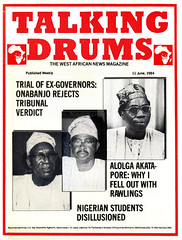Question Of Power
A Touch of Nokoko by Kofi Akumanyi
To probe deeper into the concept of political power I thought I should pick the brains of ordinary people on the subject and so hit on the idea of conducting a 'Give us a clue' exercise with children of a primary school near where I live with the kind permission of the teacher. The class has a multi-racial outlook. The question on the floor was: What is power? A tiny hand shot up.
"Power ... is it what makes the electric bulbs light up? ... the cooker rings to become hot to enable mummy to cook the dinner? . . ." the little boy asks hesitantly.
"Well, you're on the right tracks but power can also be quite stone cold and yet burn things," I suggest, "beside it may or may not be tangible. I mean you can't touch it".
"Oh, I know what power is," another voice from the back of the class shouted "It is strength. If you're strong then you have power. My father said. Geoff Capes has power that's why he can lift cars and heavy things. He has power hasn't he?"
"Quite right, except that power can reside in very tiny people too who can use it to perform incredible things," I say which conundrum makes the kids screw up their faces in bewilderment.
"Oh yes, I know now what it is. My father has got it. The other day my father and a huge man in the other car shouted at each other in the traffic and the big man became frightened and drove off when my father got out of his car in a very terrible mood."
"OK, I admit that could be another show of power but think about the country as a whole. Who could have bigger power than your father?"
"The Police, of course."
"No," someone cuts in, "it is the judge who sends people to prison".
"You're both right. But as you may realise, the two work together and the judge could be more powerful."
"No, he is not. The judge cannot arrest anybody. The police has the power to arrest people. Haven't you seen them on the television? They use horses to stop the striking miners from picketing," one young fellow educated me.
"The Police has power to arrest people who break the laws of the country and the judge sends such people to jail if found guilty of the offence. But the power or authority they have was given to them by someone. Who is it?" I ask.
"The Prime Minister, Mrs Margaret Thatcher?"
"The Queen?" suggests another.
"God?" come the rapid replies from the class.
"Very intelligent children, you all are. All those you've mentioned no doubt have power," I say "but, you see the power of these three have been limited over the years."
"How?" they ask in unison and I realise that the exercise is becoming more complex than I anticipated.
"Many, many, years ago the King or Queen had absolute power in the whole country and he or she could do anything he or she liked."
"Who gave her the power?", my question comes back to me.
"Good question," I commend the questioner, "She used to say that she derived it from God".
"What happened to change it?" "
Well, people she ruled challenged that view and said that since they provided the money through taxes etc to run the country they have the power to decide things for themselves."
"Is that why we have the parliament where people vote to elect others to make laws?" a politically-inclined little chap asks.
"You're spot on. So these days, real power, it is claimed, resides in the ordinary people," I conclude the very illuminating discussion.
"Please, Sir, there's one thing I don't understand," asks a little boy who has not spoken since the beginning of the session." What's the role of soldiers in all this?"
"Well, they are there to protect the country against enemies from outside."
"Who said so?"
"Look, youngman, that's the law.Soldiers protect the state."
"No, not in my country. My father says because they have the guns, they have the real power."
He is black and probably comes from Africa somewhere.
